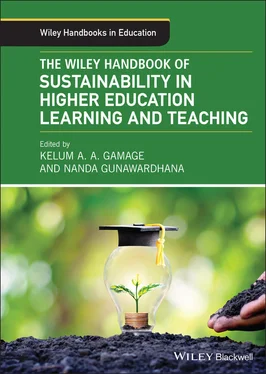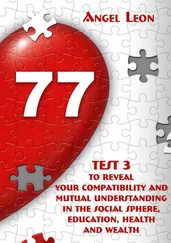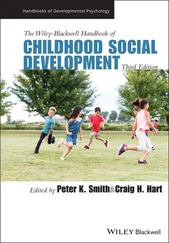34 Gibson, R.B. (2006). Beyond the pillars: sustainability assessment as a framework for effective integration of social, economic and ecological considerations in significant decision‐making. Journal of Environmental Assessment Policy and Management 8 (3): 259–280. https://www.worldscientific.com/doi/abs/10.1142/S1464333206002517.
35 Gorski, P.C. and Chen, C. (2015). “Frayed all over:” the causes and consequences of activist burnout among social justice education activists. Educational Studies 51 (5): 385–405.
36 Gramatakos, A.L. and Lavau, S. (2019). Informal learning for sustainability in higher education institutions. International Journal of Sustainability in Higher Education 20 (2): 378–392.
37 Gruenewald, D.A. (2003). Foundations of place: a multidisciplinary framework for place‐conscious education. American Educational Research Journal 40 (3): 619–654.
38 Haggar, P., Whitmarsh, L., and Skippon, S.M. (2019). Habit discontinuity and student travel mode choice. Transportation Research Part F: Traffic Psychology and Behaviour 64: 1–13.
39 Hassanain, M.A. (2008). On the performance evaluation of sustainable student housing facilities. Journal of Facilities Management 6 (3): 212–225.
40 Hassanien, A. (2006). Student experience of group work and group assessment in higher education. Journal of Teaching in Travel & Tourism 6 (1): 17–39.
41 HM Government (2011). Skills for a green economy: a report on the evidence. https://www.gov.uk/government/uploads/system/uploads/attachment_data/file/32373/11‐1315‐skills‐for‐a‐green‐economy.pdf(accessed 26 August 2021).
42 Hobert, T.M. (2010). A Follow Up Study of Eco education's environmental service learning program. PhD thesis. University of Minnesota.
43 Hopkinson, P., Hughes, P., and Layer, G. (2008). Sustainable graduates: linking formal, informal and campus curricula to embed education for sustainable development in the student learning experience. Environmental Education Research 14 (4): 435–454.
44 Jackson, P.W. (1968). Life in Classrooms. New York: Holt, Reinhart and Winston.
45 Keele University (2021). ESC‐10043 module specification. www.keele.ac.uk/catalogue/2020‐21/esc‐10043.htm(accessed 26 August 2021).
46 Knight Frank Research & UCAS (2020). Student accommodation survey 2020. https://content.knightfrank.com/research/1663/documents/en/knight‐frank‐ucas‐student‐accommodation‐survey‐report‐2020‐6841.pdf(accessed 24 November 2021)
47 Kolb, D.A. (1984). Experiential Learning: Experience as the Source of Learning and Development. Englewood Cliffs: Prentice‐Hall.
48 Kolb, A.Y. and Kolb, D.A. (2017). Experiential learning theory as a guide for experiential educators in higher education. Experiential Learning & Teaching in Higher Education 1 (1): 7.
49 Laycock Pedersen, R. (2019). Understanding and managing the impacts of transience in student‐led university food gardens. Doctoral dissertation. Keele University.
50 Laycock Pedersen, R., Robinson, Z.P., and Surman, E. (2019). Understanding transience and participation in university student‐led food gardens. Sustainability 11 (10): 2788.
51 Li, X., Tan, H., and Rackes, A. (2015). Carbon footprint analysis of student behavior for a sustainable university campus in China. Journal of Cleaner Production 106: 97–108.
52 Linder, C., Quaye, S.J., Lange, A.C. et al. (2019). "A student should have the privilege of just being a student": student activism as labor. The Review of Higher Education 42 (5): 37–62.
53 Liverman, D.M. (2018). Geographic perspectives on development goals: constructive engagements and critical perspectives on the MDGs and the SDGs. Dialogues in Human Geography 8 (2): 168–185.
54 Ludlow, J. (2010). Ecofeminism and experiential learning: taking the risk of activism seriously. Transformations: The Journal of Inclusive Scholarship and Pedagogy 21 (1): 42–59.
55 Mahmud, S.N.D. (2017). Engaging head, heart and hands: holistic learning approach for education for sustainable development. International Journal of Learning and Teaching 9 (2): 298–304.
56 de Moor, J., De Vydt, M., Uba, K., and Wahlström, M. (2020). New kids on the block: taking stock of the recent cycle of climate activism. Social Movement Studies 1–7.
57 OECD (2007) Thematic review on recognition of non‐formal and informal learning. Country background report: United Kingdom. https://www.oecd.org/unitedkingdom/41782373.pdf(accessed 24 November 2021)
58 Ollis, T. (2008). The accidental activist: learning, embodiment and action. Australian Journal of Adult Learning 48 (2): 316335.
59 Orr, D.W. (1993). Architecture as pedagogy. Conservation Biology 7 (2): 226–228.
60 Ostrow Michel, J., Holland, L.M., Brunnquell, C., and Sterling, S. (2020). The ideal outcome of education for sustainability: transformative sustainability learning. New Directions for Teaching and Learning 161: 177–188.
61 Parece, T.E. and Aspaas, H.R. (2007). Reedy Creek clean up: the evolution of a university geography service learning project. Journal of Geography 106 (4): 153–161.
62 Parrott, K.R., Mitchell, K.J., Emmel, J.M., and Beamish, J.O. (2011). If you could be in charge: student ideas for promoting sustainability in housing. International Journal of Consumer Studies 35 (2): 265–271.
63 Pines, A. (1994). Burnout in political activism: an existential perspective. Journal of Health and Human Resources Administration 164: 381–394.
64 Purvis, B., Mao, Y., and Robinson, D. (2019). Three pillars of sustainability: in search of conceptual origins. Sustainability Science 14: 681–695. https://link.springer.com/article/10.1007/s11625‐018‐0627‐5.
65 Rae, D. (2007). Connecting enterprise and graduate employability challenges to the higher education culture and curriculum? Education and Training 49 (8/9): 605–619.
66 Reed, M.S., Evely, A.C., Cundill, G. et al. (2010). What is social learning? Ecology and Society 15 (4): 1–10.
67 Redman, A. (2020). Assessing the development of key competencies in sustainability. PhD thesis. Arizona State University.
68 Robinson, Z.P. (2019). Geography as responsibility: sustainability through teaching and learning within geography. In: Handbook for Teaching and Learning in Geography (ed. H. Walkington, J. Hill and S. Dyer), 256–268. Edward Elgar Publishing.
69 Robinson, Z.P. and Molthan‐Hill, P. (2021). Assessing competencies for future‐fit graduates and responsible leaders. In: Assessment and Feedback in Apost‐Pandemic Era: A Time for Learning and Inclusion (ed. P. Baughan), 196–213. Advance HE.
70 Rodríguez‐Barreiro, L.M., Fernandez‐Manzanal, R., Serra, L.M. et al. (2013). Approach to a causal model between attitudes and environmental behaviour: a graduate case study. Journal of Cleaner Production 48: 116–125. https://doi.org/10.1016/j.jclepro.2012.09.029.
71 Scott, W.A.H. and Gough, S.R. (2003). Sustainable Development and Learning: Framing the Issues. London: Routledge.
72 Shephard, K. (2008). Higher education for sustainability: seeking affective learning outcomes. International Journal of Sustainability in Higher Education 9 (1): 87–98. https://doi.org/10.1108/14676370810842201.
73 Sipos, Y., Battisti, B., and Grimm, K. (2008). Achieving transformative sustainability learning: engaging head, hands and heart. International Journal of Sustainability in Higher Education 9 (1): 68–86.
74 Sterling, S. (2003). Whole systems thinking as a basis for paradigm change in education: explorations in the context of sustainability. Doctoral dissertation. University of Bath.
75 Sterling, S. (2004). Higher education, sustainability and the role of systemic learning. In: Higher Education and the Challenge of Sustainability: Contestation, Critique, Practice, and Promise (ed. P.B. Corcoran and A.E.J. Wals). Kluwer Academic.
Читать дальше












